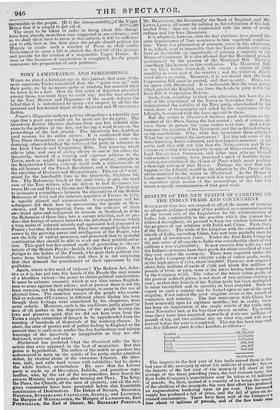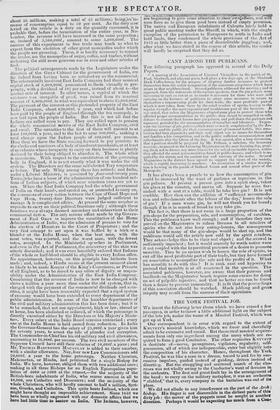RESULTS OF THE NEW SYSTEM OF CARRYING ON THE INDIAN
TRADE AND GOVERNMENT.
SUFFICIENT CHIC has not elapsed to afLrd the means of forming an adequate judgment either of the political or commercial results
of the recent acts of the Legislature for the administration of India; but, conformably to the practice which this journal has followed throughout, we proceed to keep our readers informed of the progress of our relations with India and China. First, then, of the Trade. The trade of the kingdom with the continent and islands of India, excluding China, has now been partially open for a period of twenty-one years. Under the East India Company the real value of all exports to India was considerably short of two millions a year (1,800,0001.). It now exceeds four millions; and the Indian consumers have their goods for about one-third of what they cost under the monopoly. There were exported under the East India Company about 800,000 yards of cotton goods, worth, at the high prices of 1814, about 100,0001. There are now exported above forty millions of yards of cloth and about five millions of pounds of twist, or yarn, none of the latter having been exported by the Company at all. The value of the whole cotton goods, at the present reduced prices, is not short of two millions sterling a year ; so that this branch of the Indian trade has been multiplied in value twentyfold and in quantity at least sixtyfold. Such an export to such a country may be looked upon as one of the most singular, if not indeed the most singular event in the annals of commerce and industry. The free intercourse with China has been nominally open fur eighteen months ; but in reality there has been an importation of the staple article of the trade only since November last, or for less than eleven months. Up to this time there have been imported upwards of forty-one millions of pounds of tea, and two millions are on their way, and will have arrived before the year is completed. This tea has been imported into five different ports besides London, as follows-
32,4I1g 116,.
London 784 Liverpool 5,:i70,585 Bristol 1,274,638 Leith 606,498 lvde 504,1:37 lltiblin 849,201 41,041,843
The imports in the first year of free trade exceed those in the last year of time monopoly by about 134 millions of pounds; but as the imports of the last year of the monop fell short of the average of the three preceding years, the real increase upon the East India Company's importations may be taken at 12 millions of pounds. So, then, instead of a scarcity of tea being the result of the abolition of the monopoly, the very first eflbrt has produced an augmentation bordering upon 40 per cent. The increased supply has produced a fall of price, and the fall of price an in- creased
consumption. There have been sold of the Company s teas about 19 millions of pounds, and of the free trade .teas
about 26 millions, making a total of 45 millions"; being:an:in-
crease of consumption equal to 50 per cent. i
As the duty now
levied on the article is a duty on the quantity consumed, it is probable that, before the termination of the entire year, in No- vember, the revenue will have increased in the same proportion; or instead of 3,500,000/., amount to some 5,000,0001. The success of this experiment in free trade may teach us what to expect from the abolition of other great monopolies under which the people are groaning. These, it is hardly necessary to remind the reader, are the monopolies of sugar, coffee, and timber, without reckoning the still more grievous one in corn and other articles of food.
The political arrangements made by the Legislature under the
direction of the GREY Cabinet for the government of India, are far indeed from hoeing been so satisfsetory as the commercial. The substantially insolvent East India Company had their nominal capital steel: of 6,000,0001. guaranteed to them virtually in per- petuity, with a di%idend of 10% per cent., instead of about 4—the market rate of interest. In other terms, a capital of which the existence was incapable of proof, was raised from its nominal amount of 6,000,0001. to what was equivalent to above 15,000,000/. The payment of the interest on this pretended property of the East India Company, about 630,0001. a year, and which had before been paid by the people of England through the tea monopoly, is now laid upon the people of India. But this is not all that the Indians are called upon to pay. They are called upon to pension the whole commercial service of the East India Company, civil and naval. The annuities to the first of these will amount to at least 100,000/. a year, and to the last to near 300,0001., making a total charge upon the Indian people of 400,000/. per annum. Here then we have the State coming forward to pay pensions to the clerks and mariners of a. body of insolvent merchants, or at least of merchants whose incapacity to carry on their business is plainly declared by their being obliged to abandon it. The whole affiiir is monstrous. With respect to the constitution of the governing body in England, it is as yet exactly what it was under the old system. The Directors are the same self-elected Tory corporators as before. The only Whig among them has retired ; and India, under a Liberal Ministry, is governed by four-and-twenty pure Tories,',oho have a lease of the administration of one hundred mil- lions of Indian subjects, of which near nineteen years are yet to run. When the East India Company had the whole government of India on their hands, and carried on, or pretended to carry on, the commerce of every nation between the Cape of Good Hope and Cape Horn, twenty-four Directors were judged sufficient to manage th it complicated affairs. At present the same number is requisite to carry on their political functions only ; although these functions wet e always deemed secondary and subservient to their commercial duties. The only serious effort made by that Govern- ment of Earl GREY to improve the constitution of the Home Administration of India, was the admission of proxies to vote for the election of Directors in the Court of Proprietors ; and the very first attempt to act upon it was baffled by a trick or a blunder at the India House, when the best man, with the most votes, was rejected, and the worst man, with the fewest votes, accepted. In the Ministerial speeches in Parliament, and even in the Act of Parliament, the aristocracy of the skin was utterly discarded; and it was even boastfully ordered that Indians of the whole or half-blood should be eligible to every Indian oilice. No appointment, however, on this principle has hitherto been made ; and, indeed, a Hindu seems at the present moment about as likely to be made Keeper of the King's Conscience, or Primate of all England, as to be raised to any office of dignity or respon- sibility under the Administration of the East India Company. Considering that the revenue of India is now to be charged with above a million a year more than under the old system, that is, charged with the payment of the commercial dividends and secu- rities, it might have been reasonably expected that a rigid system of economy would have been extended to every department of the public administration. In some of the humbler departments of the civil and military administration this has been done; but it is to Le remarked, that not one appointment, high or Jow, abroad or at home, has been abolished or reduced, of which the patronage is directly exercised either by the Directors or his Majesty's Minis- ters. Every salary at the India Board remains untouched ; every one at the India House is held sacred from reduction. In India the Governor-General has the salary of 25,000/. a year given him for seventy years, to arrest the tide of plunder and corruption. The Commander-in-Chief has his old military and civil allowances, amounting to 16:0001. per annum. The two civil members of the Supreme Council have still their salaries of 10,000/. a piece ; and Mr. THOMAS BABINOTON MACAULAY is added to their number, with a similar allowance. Nay, four new Law Commissioners add 20,000/. a year to the home patronage. Neither Christian, Mahometan, or Hindu, had petitioned for a single Bishop for India.. We have, however, obliged them with two additional ones ; making in all three Bishops for an English Episcopalian popu- lation of 4000 or 5000 at the utmost,—for the majority of the British-born inhabitants of India, who scarce amount in all to 40,000, are Catholics and Dissenters; and the majority of the whole Christians, who will hardly amount to half a million, Syri- ans, Greeks, and Catholics. This quite beats Ireland, which one might have thought an impossible achievement. Since 1833 we have been so wholly engrossed with our domestic affairs that we have had little time to bestow on India. The Indians, however, are beginning to give some attention to.their,ownfaffairs, and wi soon force us to give them good laws instead of empty promises. The native and European inhabitants of Calcutta lately held a great public meeting under the Sheriff, in which, with the single exception of the permission to Europeans to settle in India and hold lands, they condemned the whole provisions of the Act of 1833 as little better than a piece of discreditable juggling ; and, after what we have stated in the course of this article, the reader will hardly be surprised that they did so.



























 Previous page
Previous page